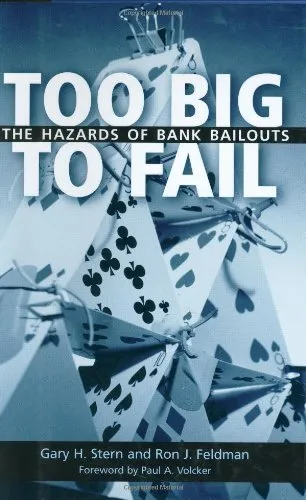Too Big to Fail: The Hazards of Bank Bailouts
4.0
Reviews from our users

You Can Ask your questions from this book's AI after Login
Each download or ask from book AI costs 2 points. To earn more free points, please visit the Points Guide Page and complete some valuable actions.Introduction
In the wake of financial crises, there is an often-debated topic that resurfaces with urgency: the "Too Big to Fail" doctrine. Gary H. Stern and Ron J. Feldman approach this critical theme with their incisive book, 'Too Big to Fail: The Hazards of Bank Bailouts', offering a thorough analysis of the implications and challenges associated with financial institutions deemed too critical to the economy to be allowed to fail. This book serves as an important resource for understanding the intricate balance between economic stability and moral hazard posed by government bailouts.
Detailed Summary of the Book
The book delves into the concept of "Too Big to Fail" (TBTF), dissecting the underlying assumptions and consequences of this doctrine. Stern and Feldman contend that TBTF institutions are those that pose a systemic risk to the economy, and thus, are often shielded by government interventions during financial distress. The authors argue that while such measures aim to stabilize markets, they inadvertently encourage excessive risk-taking.
Through a historical lens, the book examines past financial crises, illustrating how the adoption of TBTF policies has often led to costly taxpayer-funded bailouts. Stern and Feldman advocate for robust regulatory frameworks and discuss alternative mechanisms that can reduce the reliance on bailouts. Their critique extends to the interconnectedness of financial institutions, the role of regulators, and the need for accountability in mitigating risks.
Key Takeaways
- The moral hazard created by government bailouts can lead to more unpredictable financial behavior among large institutions.
- The identification and monitoring of systemic risks are crucial in averting potential financial collapses before they occur.
- Regulatory reforms must balance the need for financial innovation with systemic stability.
- Heightened transparency and accountability can deter the reckless behavior encouraged by existing TBTF perceptions.
Famous Quotes from the Book
"The doctrine of 'Too Big to Fail' creates a cycle that is both dangerous and costly—sowing the seeds for future financial calamities."
"Only by addressing the root causes of financial instability can we hope to safeguard our economy from the perils of complacency."
Why This Book Matters
As a cornerstone of financial regulation literature, 'Too Big to Fail: The Hazards of Bank Bailouts' is invaluable for policymakers, economists, and anyone interested in the architecture of modern financial systems. The book provides critical insights into how financial stability can be achieved without compromising the incentives that drive prudent economic behavior. Stern and Feldman's analysis encourages a re-thinking of current policies and highlights the vital role of proactive, rather than reactive, measures in safeguarding economic health.
This work is particularly salient in today's global economy, where financial institutions have become larger and more interconnected than ever, posing unprecedented systemic risks. By shedding light on the implications of TBTF, Stern and Feldman force readers to confront uncomfortable truths about our financial system and the urgent need for reform.
Free Direct Download
You Can Download this book after Login
Accessing books through legal platforms and public libraries not only supports the rights of authors and publishers but also contributes to the sustainability of reading culture. Before downloading, please take a moment to consider these options.
Find this book on other platforms:
WorldCat helps you find books in libraries worldwide.
See ratings, reviews, and discussions on Goodreads.
Find and buy rare or used books on AbeBooks.
1230
بازدید4.0
امتیاز50
نظر98%
رضایتReviews:
4.0
Based on 0 users review
"کیفیت چاپ عالی بود، خیلی راضیام"
Questions & Answers
Ask questions about this book or help others by answering
No questions yet. Be the first to ask!


